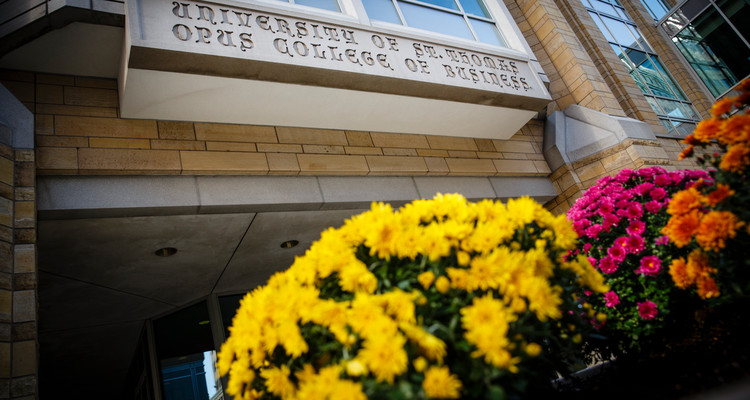Before taking Business 200, many students are uncertain of what to expect or even nervous about balancing the class with the rest of their schedule. To be fair, Business 200, a longstanding tradition at St. Thomas, is unique: Instead of learning about the business of nonprofits from a theoretical angle, students are called to volunteer and give back to the community.
Through Business 200, a graduation requirement for all business undergraduates, students dedicate 40 hours to a nonprofit of their choice. During that time, they also examine their experience with their classmates, considering what they’re learning and how it will pertain to their careers.
“We create effective, ethical leaders,” said Barbara Gorski, who has organized Business 200 since its third year at St. Thomas. It is now in its 25th year. “We teach why you need to understand that the community has to be healthy to support business.”
While students may enter Business 200 nervous, they leave with a richer understanding of themselves and the community surrounding them.
Real-world experience
Business 200 strives to educate students on how they can be both successful business people and make a positive impact on the world, particularly the community surrounding a business.
The students are instructed to pick a volunteer site that will both challenge them by meeting people they may have not interacted with before, and also will help them develop skills that will benefit their careers.
“We ask them to think about what you need at this point in your life,” Gorski said. “Look at where you are now and where you want to go.”
Sophomore Steven Widlowski, a seminarian at Saint John Vianney and a business administration minor, used his Business 200 time teaching religious education classes at St. Peter’s Catholic Church in Mendota, Minnesota – a likely beneficial experience for a future priest.
“Being able to gain real-world experience was very valuable,” Widlowski said. “The goal for everyone, and I was able to experience this, is to get involved and feel that we directly relate to our career path.”
Gorski said that one of the primary objectives is to support St. Thomas’ mission by teaching the students empathy.
“We press that [the students] need to experience groups and cultures more diverse than what they have experienced so far,” Gorski said. “Whether that means being with elderly, people of color, special abilities or religious people. ... They really understand the other. They see the complexities.”
Junior Tri “Tony” Vo took that message to heart when he decided where to volunteer: He volunteered with a Keystone Community Services food shelf and in an adult development classroom with Resource Minnesota. He said he wanted to understand, “What kind of situations cause [adults] to need these programs,” and to better unpack his own preconceptions.
In the classroom
Throughout the semester, students keep journals and occasionally meet to discuss what they are each doing, useful resources for thinking critically about the nature of volunteering and learning more about the community.
“Asking questions, thinking in this gray space, is what matters most,” Vo said. “What responsibility does a business have to serve these communities at expense, or is it an expense to cut down profits to lift up these communities? ... Business 200 talks about social responsibility to argue against views of business that the bottom line is the most important.”
Senior Hadley Ryan, who volunteered with Junior Achievement and taught second- and third-graders about business literacy concepts, said she was amazed to learn about all of the nonprofits just in the local area.
“It makes you extremely thankful for the support you realize your community has for each other,” Ryan said. “There’s amazing resources for all different people at different stages in their lives with different problems. ... There’s a nonprofit for every type of problem, and I think it’s important people know there’s a support system behind you.”
A ripple effect
As is often the case with a volunteer experience, many of the students found themselves changed. Ryan volunteered in a classroom again this semester and will participate in JA in a Day in May.
“I feel obligated because I see kids smiling and having fun and not realizing they’re learning,” Ryan said. “You realize how important it is to teach kids about good financial choices and what it means to run a business. ... This was a really valuable experience and I’m extremely thankful I got to do it.”
Widlowski continued teaching his religious education class this semester while Vo went on a VISION trip to Colorado. Vo said his career expectations have changed as a result of Business 200: He now wants to work for a company that is “centered around a meaningful goal or serving the community.”
Ryan’s experience already has paid dividends for her impending career: She has secured a job with SPS Commerce, a technology company in Minneapolis. The individual with whom she interviewed also had connections with Junior Achievement.
“That was a huge deciding factor that we clicked and related on,” Ryan said.
Gorski said she is incredibly proud of the work they do in Business 200, both in terms of how it affects the local community and how it affects St. Thomas students.
“You see all these ripples,” Gorski said. Since 2008, Business 200 has averaged 762 students and 30,629 service hours a year. That’s a lot of ripples to send out into the world.
“You have the students who talk about helping a fourth-grader learn to read and his mom came to thank them,” Gorski said. “This required involvement has not only helped the fourth-grader get up to grade level but also impacted our student in their view of how they could impact the world. It may be one student at a time, but our students leave realizing the power they have to be changemakers.”







